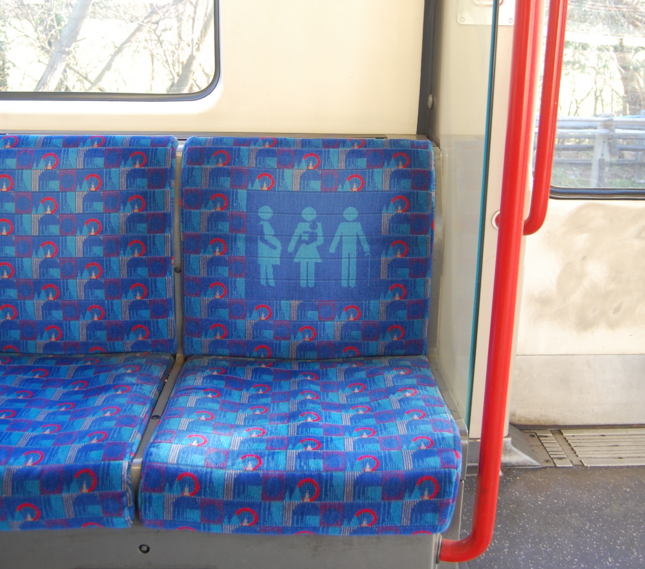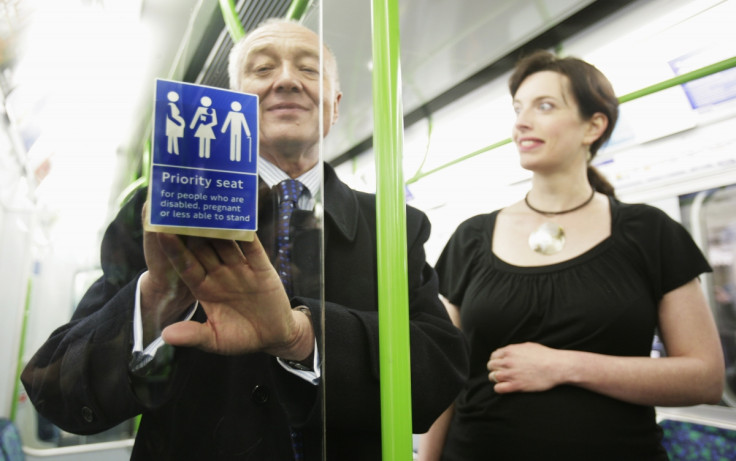Why I gave up wearing my Baby on Board badge on the Tube
It was either deliberately ignored or earned me a disdainful look.

A man asked a pregnant woman who was wearing a Baby on Board badge "Where is the baby?" after she asked for a seat on the Tube on 28 October.
I'm curious to know how he was expecting Raayan Zafar to "prove" her early pregnancy on a packed carriage. Confidential maternity notes? A slideshow of scan pictures? A bank statement showing purchases in Mothercare? Hopefully not a live pregnancy test.
But more shocking than the incident was the reaction to it. Many women have since shared their similar experiences:
@Spinthu tweeted: "Londoners get your act together I was frequently left standing throughout pregnancy even with baby on board badges!![sic]"
@Lisabetal tweeted: "Heavily pregnant and feeling faint sister asked man for his seat on Tube. He said it was her choice to be pregnant"
@Charly_Pope tweeted: "travelling on the Tube when pregnant was the worst time of my life! People were rude and rarely moved even when I was 8mnths! :("
And then there were those who seemed fundamentally outraged by the prospect of people giving up a seat for a pregnant woman at all.
The top-rated comment on the Daily Mail website with nearly 7,000 upvotes reads: "If she's in the early stages she can hardly expect a seat. She's pregnant not disabled!"
@wazzywazz tweeted: "You shouldn't expect anyone to give up their seat pregnant or not. She chose to spread her legs so deal with the consequences"
@Spokes78 tweeted: "it's not the law to give a pregnant lady your seat. If you're well enough to work you're well enough to stand on the train"
Yes, in most cases (but certainly not all) women do decide to get pregnant and start a family. Yes, we know that pregnancy is not an easy ride. And yes, we know women have been having babies for thousands of years.

As a Londoner, I am fully aware of Tube seat politics. Commuters know where to stand on the platform, how to jostle onto a carriage first to get a seat, the quickest exits to use and to never, ever climb the stairs at Covent Garden station. I also know it's easy to feel frustrated with the seemingly endless crowds and delays during rush hour – so a sense of other people's entitlement can leave some people angry.
I don't mind admitting that I had a naive view of pregnancy – pregnancy yoga, spending weekends shopping for cute baby things, decorating the nursery so it looked like something you'd see on Instagram, and eating a lot of cake. I did none of these.
I started off exhausted, and then came the morning sickness. "This is normal ... it will be over soon," I kept telling myself. But my sickness quickly escalated and by eight weeks I was being sick up to 20 times a day, every day.
Unable to keep down even water, I was diagnosed with Hyperemesis Gravidarum (the same condition Kate Middleton was diagnosed with during both pregnancies) and hospitalised three times during my pregnancy. I lost 8kg and didn't look pregnant, but I had never felt worse.
One doctor told me: "We don't tell women how tough pregnancy is, otherwise there would be no more babies!"
Tube journeys were a nightmare. I gave up wearing my Baby on Board badge as it was either deliberately ignored or earned me a disdainful look. To stop myself from fainting, I resorted to sitting on the Tube carriage floor. I often got off the Tube during a journey for air or to be sick. I even stayed in hotels when too ill to travel.
I could count the times I was offered a seat on one hand. As I went on maternity leave, I was so relieved to stagger off the Tube for the last time. There are so many reasons why women continue to work when pregnant and feeling desperately unwell, including financial pressure and the expectation that you "just need to get on with it".
I admit my case is extreme – Hyperemesis Gravidarum is thought to affect around one in every 100 pregnant women. But even those who have a "normal" pregnancy will feel awful at times. The first 12 weeks, before you look pregnant or want announce your happy news, can be the hardest.
The charity Pregnancy Sickness Support states that 70-80% of pregnant women will suffer from nausea and vomiting. The NHS website has a long list of additional medical conditions pregnant women can face.
The size of a baby bump has nothing to do with how a pregnant woman might be feeling. TfL offers these badges to pregnant women as they know they can become ill and would benefit from a seat, rather than becoming very unwell and needing assistance from staff, which would ultimately delay trains.
A survey by London Underground in 2006 revealed that 35% of mums-to-be were never offered a seat, while 71% cited rude and discourteous behaviour. Almost 10 years later, not much seems to have changed.
What kind of society do we live in if people judge, dismiss or angrily confront others just because we don't think they look like they are pregnant, ill or struggling?
Jo Crosby is a freelance public relations consultant and writer. She has worked for Reuters, Getty Images, A1GP, Financial Times and Time magazine. She can be found tweeting @jocrosbypr
© Copyright IBTimes 2025. All rights reserved.




















